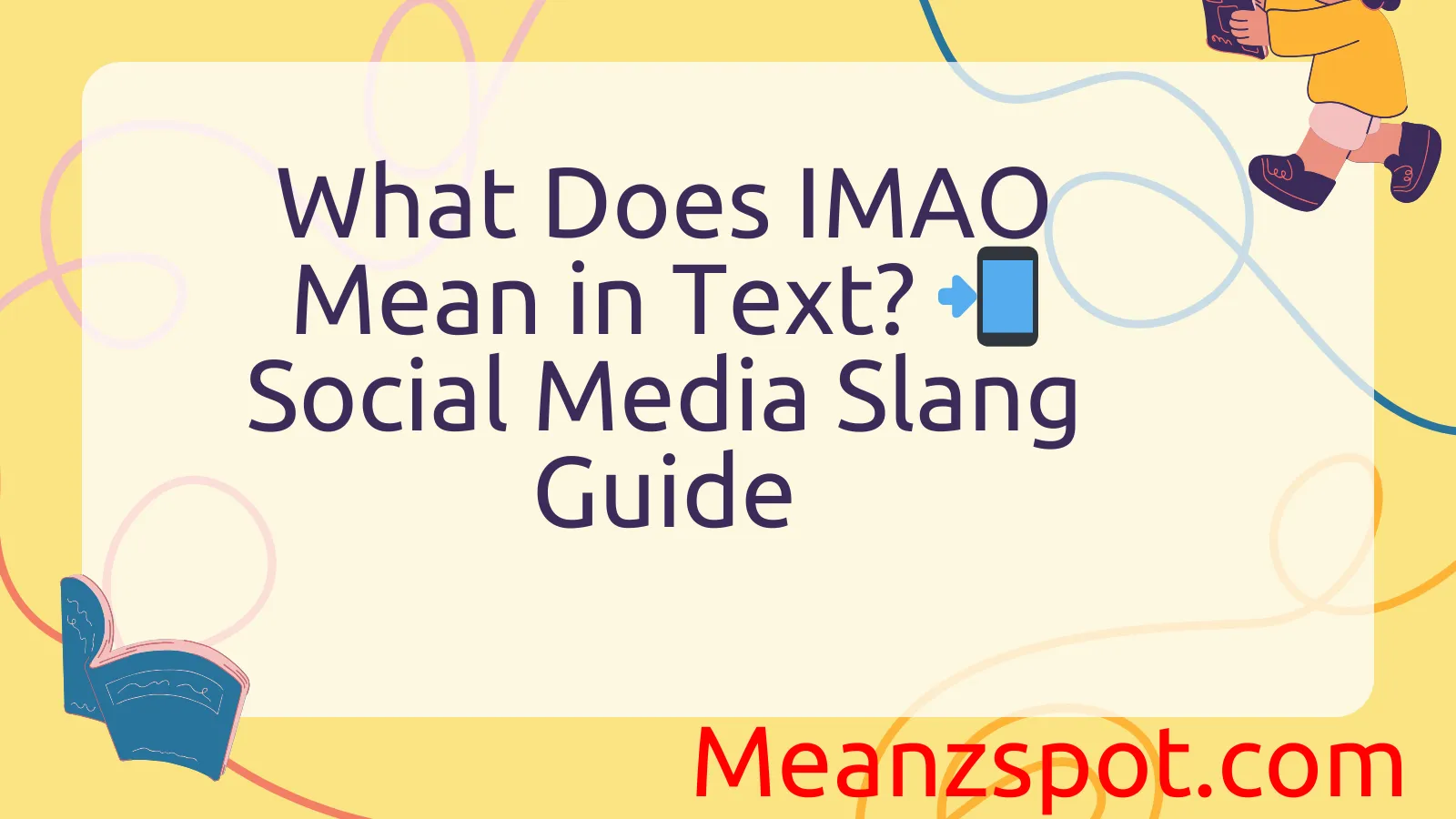Ever scrolled through a chat or social media post and spotted IMAO but had no clue what it meant? 📲 You’re not alone! Slang and acronyms move fast online, and it’s easy to feel left behind. The good news is that IMAO is super simple once you break it down. It’s often used in texts, memes, and comment sections to show someone’s opinion in a bold, sometimes humorous way.
Think of it as a casual, internet-friendly way of saying, “Here’s what I really think.” In this guide, we’ll explain exactly what IMAO means in text, where people use it, and share fun examples so you’ll never get confused again. 🚀
Definitions & Meaning
IMAO is a common texting acronym that typically stands for “In My Arrogant Opinion.” It is a twist on the more frequently used IMHO, which means “In My Humble Opinion.” While IMHO attempts to present a viewpoint modestly, IMAO intentionally adds a dose of self-awareness, sass, or sarcasm, often used humorously or to preface a bold or controversial statement.
For example:
- IMAO, that movie was overrated and not worth the hype.
- IMAO, pineapple on pizza is the best combo—fight me.
In some cases, people may also mistakenly use “IMAO” when they mean “LMAO” (“Laughing My A** Off”), due to the similar arrangement of letters. However, the meanings are entirely different, and context is crucial for distinguishing them.
Overall, “IMAO” is a way to assert an opinion with flair, often used tongue-in-cheek or with a playful tone.
Origins & History
The emergence of “IMAO” can be traced back to early internet forums, blogs, and message boards in the late 1990s and early 2000s. During that era, acronyms like “IMHO” and “LOL” became popular among internet users looking to save time and space while expressing themselves. As these expressions gained traction, variations naturally developed to suit different tones and personalities.
“IMAO” began as a satirical counterpart to “IMHO.” It was likely used by individuals who wanted to emphasize that their opinion wasn’t humble at all—in fact, it was intentionally arrogant or unapologetically assertive. The phrase caught on with those who enjoyed using sarcasm and wit in their online interactions.
The growth of meme culture and social media platforms such as Twitter, Reddit, and Tumblr further contributed to the spread of “IMAO.” Users embraced it as a clever way to signal confidence, humor, or deliberate contrarianism. Though it’s less common than its humble cousin, “IMAO” has carved out a niche for itself in internet lingo.
Usage in Different Contexts
1. Social Media:
On platforms like Twitter and Instagram, users often use “IMAO” when sharing opinions with a hint of sarcasm or irony. For instance, someone might tweet, “IMAO, people who don’t like coffee are just wrong.” It signals both humor and a strong personal stance.
2. Online Forums & Comment Sections:
In places like Reddit, “IMAO” is used to express bold or controversial takes without sounding overly serious. It offers a buffer that tells readers, “Yes, I’m being bold, but I’m also self-aware.”
3. Messaging Apps:
Friends might use “IMAO” in group chats to preface a strong opinion while keeping the tone light or humorous. It helps frame the conversation in a non-confrontational way.
4. Pop Culture & Memes:
In meme culture, “IMAO” sometimes appears in image captions or commentaries to mock certain opinions or trends. For example, a meme could say, “IMAO, this is peak cinema,” over a funny or ridiculous film still.
5. Professional or Formal Contexts:
You’re unlikely to see “IMAO” used in professional emails or workplace chats unless the environment is very informal or among close colleagues. In most professional contexts, acronyms like this are best avoided to maintain clarity and tone.
Common Misunderstandings & Clarifications
One of the biggest sources of confusion around “IMAO” is its similarity to “LMAO,” which stands for “Laughing My A** Off.” The two acronyms differ significantly in meaning and usage:
- LMAO is used to express laughter or amusement.
- IMAO is used to preface a confident or arrogant opinion.
Because both acronyms contain the letters “M,” “A,” and “O,” they can be easily mistyped or misread. This has led to humorous or confusing moments in chats where someone says “IMAO” expecting laughter and instead sounds like they’re offering an arrogant opinion.
Another point of confusion is the tone. While “IMHO” sounds respectful and humble, “IMAO” is the opposite. Some people might misinterpret its usage as genuine arrogance or rudeness, especially in text-only environments where tone is hard to detect.
Clarification Tip: Always read the surrounding context. If the message is humorous or sarcastic, “IMAO” is likely being used playfully. If the tone is confrontational, it might genuinely reflect arrogance.
Alternatives & Synonyms
If you want to express a strong opinion with a bit of flair, but “IMAO” doesn’t quite suit your style, here are a few alternatives:
- IMHO (In My Humble Opinion): A more modest way to state your thoughts.
- TBH (To Be Honest): Often used to express honesty or candidness.
- Just Saying: A casual way to present an opinion without sounding aggressive.
- No Offense, But…: A softer preface, though often ironically followed by something offensive.
- Not Gonna Lie (NGL): Used to introduce a truthful or strong opinion.
- Real Talk: Used to signal sincerity or seriousness in a statement.
Each of these alternatives carries its own tone and nuance. Choosing the right one depends on the context, your intent, and how you want your message to be received.
Frequently Asked Questions (FAQ)
1. What does IMAO stand for in texting?
IMAO stands for “In My Arrogant Opinion.” It’s a sarcastic or humorous twist on “In My Humble Opinion.”
2. Is IMAO the same as LMAO?
No, IMAO and LMAO are different. LMAO means “Laughing My A** Off” and expresses amusement, while IMAO introduces a bold or arrogant opinion.
3. When should I use IMAO?
Use IMAO when you want to share a strong opinion with a touch of sarcasm or self-awareness, especially in casual or humorous settings.
4. Is using IMAO rude?
Not necessarily. It depends on tone and context. It can come off as arrogant if misunderstood, so use it thoughtfully.
5. Can I use IMAO in professional communication?
Generally, no. It’s best reserved for informal chats. In professional settings, stick to more neutral language.
6. Are there emojis I can pair with IMAO?
Yes! Emojis like 😏, 😬, or 😂 can help convey the tone and prevent misinterpretation.
7. What’s a safer alternative to IMAO?
Try “IMHO” or “TBH” if you want to avoid sounding arrogant while still sharing your opinion.
Conclusion
IMAO is a fascinating example of how language and humor evolve in the digital age. As a playful variation of more conventional acronyms, it reflects the personality and tone of the modern internet user—confident, ironic, and often tongue-in-cheek. While it may not be as widely recognized as “LOL” or “LMAO,” it adds flavor to conversations when used appropriately.
Understanding the meaning, origin, and proper context of IMAO not only improves digital literacy but also ensures that your communication remains clear and relatable. Next time you see or consider using “IMAO,” you’ll know exactly what it implies—and how to use it with confidence and clarity.



